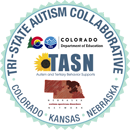Building Authentic and Meaningful Communication Strategies (2021-2022 Tri-State Autism Webinar Series)
Audience: Advocates, Educators, Other District/School Staff, Parents | Topic: Autism, Special Education | Hosted by: Office of Special Education
Requirement for School / District Staff: N/A

On-Demand format
Presented by Rachael Langley, MA, CCC-SLP, AAC Specialist
We know that learners with communication challenges have thoughts, opinions, and ideas of their own. How do we give them the tools to tell us what they’re thinking? This session will talk about tools and strategies to support early communication skills, including how to begin using AAC (augmentative/alternative communication).
Learner Objectives:
During this hour, we will address the following questions:
- What is the role of the communication partner in early AAC use?
- How can a parent/teacher/therapist coach someone to use AAC while still letting the AAC user’s thoughts and opinions shine through?
- How does prompting fit into learning AAC? Are there other strategies besides prompting that we could use?
Through answering these questions, we will focus on supporting authentic and meaningful communication that is relevant to our learners. Resources for continued learning will also be provided.
Watch
About the Presenter
Rachael Langley is a speech-language pathologist working as an Augmentative/Alternative Communication (AAC) Consultant in Michigan. Her 19-year career has focused primarily on supporting students with complex communication needs. A two-time graduate of Michigan State University, Rachael is one of the founders and organizers of the #TalkingAAC Conference, a conference focused specifically on AAC learning. Rachael has presented at local, state, and national conferences. She enjoys creating graphics and other materials related to AAC implementation.
Contact Information
Rhonda Danner[email protected]
Certificate
After watching this recorded webinar a certificate for 1.25 hours is available. Participants must complete a brief survey then they will receive a certificate.

< Return to On-Demand Resources
< Return to Professional Development Home Page





Connect With Us





